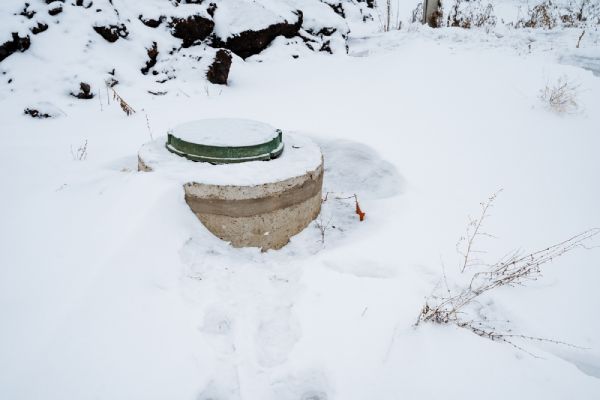
As winter descends upon Rochester, NY, homeowners should understand the potential impact of cold weather on their septic systems. With freezing temperatures and seasonal challenges, septic systems are prone to various issues that can disrupt their functionality. In this article, we'll explore the effects of cold weather on septic systems and provide insights into preventative measures and effective solutions to ensure the smooth operation of these critical components of residential properties.
You can rely on the expertise of Mr. Rooter Plumbing for a comprehensive range of septic system services, including installation, repair, and maintenance. Whether you need septic tank pumping, drain field installation, or maintenance, our licensed and insured service professionals are available to address all your septic system needs. Contact us today!
What Cold Weather Does To Your Septic System
Impacts Septic Tank Bacteria
What is septic tank bacteria? These bacteria play a vital role in breaking down waste in your tank, turning it into simpler substances through decomposition. During winter, low temperatures can significantly affect the survival and functionality of septic tank bacteria. Low temperatures can impact these essential microorganisms, affecting their survival and functionality. As these bacteria slow down in the cold, the process of waste digestion can take a hit, potentially leading to sludge buildup in your tank.
If you're considering adding bacterial products to your septic tank, it is important to note that these additives may potentially cause more harm than good. To ensure the optimal health of your septic system, it is recommended to consult with a plumber before using any bacterial additive products.
Potential Freezing of Septic Tank and Pipes
When the septic tank and pipes freeze due to plunging temperatures, it can spell trouble for your entire septic system. A frozen septic tank can lead to a backup of wastewater into your home, causing unpleasant odors, sewage leaks, and potential health hazards. As the water freezes, it expands, which can put immense pressure on the walls of the tank or pipes, increasing the risk of cracks or even a complete rupture.
These damages can result in costly repairs and disruptions to your daily routine until the system is fixed and functioning properly again. Preventing freezing is crucial to avoid these detrimental consequences and ensure your septic system operates smoothly throughout the winter months.
Thawing Effects on Drain Field
As the winter chill starts to thaw and water flows once again, your drain field can face its own set of challenges. The thawing water can saturate the drain field, potentially leading to environmental contamination. Understanding the consequences of thawing on your drain field is essential for safeguarding your property and the environment. Let's dive deeper into how you can mitigate these risks and keep your drain field and septic system in top-notch condition.
Preventative Measures You Can Take for Septic Systems Before Cold Weather Approaches
Routine Maintenance
Regular servicing is key to keeping your septic system running smoothly, especially before the temperatures drop. Consider incorporating bacterial additives and cleaners to support the good bacteria in your septic tank and promote efficient waste digestion. By staying on top of routine maintenance, you can ensure your septic system weathers the winter like a pro. Mr. Rooter Plumbing offers installation, repairs, and maintenance for septic systems. Contact us today to come take a look at yours!
Drain Field Protection
Implementing measures to protect your drain field, such as using risers can make a world of difference. Drain field risers are extensions added to septic tank access points to bring them closer to the ground surface for easier maintenance and inspection. If your septic system or drain field is particularly new, it’s also a good idea to mulch the drain field area before freezing temperatures hit. Grass cover will aid in preventing the freezing of the drain field.
Clean & Move Gutters Away From The Area
Ensure that your gutters are free of debris and move them so they direct water away from the drain field area to prevent excess water from contributing to frozen ground in your leach fields. By managing the flow of water away from your septic system, you can reduce the risk of freezing issues and help maintain the functionality of your system throughout the winter months.
When to Seek Professional Help for Your Septic System
If you suspect that your drain field is flooded, it's crucial to take immediate action and reduce water usage to alleviate pressure on your septic system. Avoid unnecessary flushing, limit showers, and refrain from running the dishwasher or doing laundry until the drain field has had time to dry out. Additionally, it is not advisable to continuously run water from your faucets to try and thaw a frozen system tank. Pumping the septic tank while it's flooded can result in damage, so it's best to seek advice from a professional plumber if you suspect any issues with your septic system. A timely assessment by an expert can help prevent further damage and ensure the proper functioning of your septic system.
Take Action Now to Preserve Your Septic System
As the snow falls and the temperatures dip, remember that proactive maintenance is the key to keeping your septic system in top shape during the winter months. By understanding how cold weather affects your septic system and taking preventative measures, you can ensure it operates smoothly all season long. For professional assistance with your septic system maintenance and repair needs, turn to your friendly experts at Mr. Rooter Plumbing of Rochester - contact us today!

